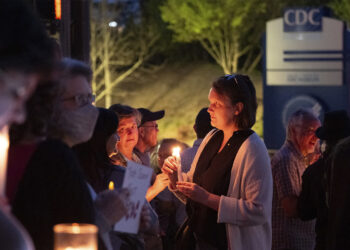
- The time of day you consume coffee may affect mortality risk, especially from cardiovascular disease.
- People who consume coffee primarily in the morning, rather than throughout the day, had lower mortality risk compared to non-coffee drinkers, according to a new study.
- It’s unclear why morning coffee consumption appears to offer greater heart health benefits. Experts note that consuming coffee later in the day may disrupt sleep patterns.
In case you needs another reason to start your day with coffee, those who have a cup of joe in the morning have a lower risk of death from cardiovascular disease and lower overall mortality risk compared to those who drink coffee throughout the day or don’t drink it at all.
The novel research, published January 8 in the European Heart Journal, is the first of its kind to look at patterns of coffee drinking and whether the time of day of consumption affects mortality outcomes.
Research has frequently focused on quantity of consumption: how many cups is too much? However, far less is known about how time of consumption patterns affect health.
The study, led by Lu Qi, MD, PhD, HCA Regents Distinguished Chair and Professor at the Celia Scott Weatherhead School of Public Health and Tropical Medicine at Tulane University, offers compelling data to consider not just how much coffee you consume, but when.
“Drinking coffee in the morning shows a better beneficial relation than all-day drinking with cardiovascular and all-cause mortality,” Qi told Healthline.
The observational study involved more than 40,000 adults from the National Health and Nutrition Examination Survey (NHANES) and 1,463 adults from the Women’s and Men’s Lifestyle Validation Study.
Both surveys include health and lifestyle data for a cross section of adults in the United States, including questions about coffee and caffeine consumption.
Almost half of the participants (48%) were non-coffee drinkers, while the remaining participants were divided into two groups based on their coffee consumption pattern. About one-third of participants were “morning-type” coffee drinkers, meaning they consumed almost all coffee before noon, rarely consuming it in the afternoon or evening.
The second group, the “all-day-type” (16% of participants), preferred to consume coffee spread throughout the day and into the evening.
Only the morning coffee group demonstrated significant risk reduction in all-cause mortality and cardiovascular disease-related death.
Over a nearly decade-long follow up period, researchers found that individuals who consumed their coffee in the morning had significantly lower risk of both all-cause mortality and cardiovascular disease-related death compared to non-coffee drinkers.
Compared to non-coffee drinkers, morning coffee drinkers had a 16% lower risk of all-cause mortality, while cardiovascular disease-related death risk decreased by 31%. There was no reduction in mortality risk for all-day coffee drinkers.
“The body has a diurnal cycle of waking, going and relaxing, and eventually sleeping. Morning coffee goes along this cycle, while continued drinking, particularly in the late afternoon disrupts this cycle and sleep,” Thomas Lüscher, MD, consultant cardiologist and director of research, education and development at Royal Brompton and Harefield hospitals in the United Kingdom, explained to Healthline. Lüscher wrote an accompanying editorial to the study.
The quantity of coffee consumed in the morning also impacted heart health.
Moderate and heavy morning coffee drinkers (two to three cups or more) had greater reductions in disease-related death risk. The risk was smaller among light morning coffee drinkers (one cup or less).
The researchers also investigated cancer-related mortality risk, but did not find an association for either consumption pattern.
Despite the compelling findings, the study has several limitations.
Morning coffee drinkers, for example, were predominantly white with higher family income, making the findings difficult to generalize across more diverse populations.
Abha Khandelwal, MD, a professor of cardiovascular medicine at Stanford Medicine who wasn’t affiliated with the study, pointed out that due to the observational, self-reported data, the study has limited value.
“I don’t think you can say timing of caffeine is an important factor in mitigating mortality risk….There is not a strong or rigorous scientific basis — at most there is an association with coffee intake,” she told Healthline.
The mechanism for why the time of coffee consumption could affect mortality isn’t clear either, something the study authors admit was outside the scope of their present work. However, there are clear areas for investigation:
“Late drinking of coffee may disturb sleeping and hormones such as melatonin, which affect the body’s circadian rhythm; this may partly account for the observations,” said Qi.
So, if you’re a regular coffee drinker, try to limit consumption in the afternoon and evening.
“If drinking 2 cups or more per day, it is preferable to drink only in the morning,” said Qi.
Khandelwal, on the other hand, told Healthline it’s too early to make recommendations based on this research.
“At most, one can say if you are a coffee drinker consider limiting it to AM hours, but this study is not designed or powered to talk about causality. I think a lot more has to be done in a much more scientifically rigorous way to make bold statements to change behavior,” she said.
Coffee has been shown to have wide-ranging health benefits from the brain to heart.
However, little research has been conducted on how the time of day when you consume coffee affects these benefits.
In a first-of-its-kind study, researchers found that individuals who consume their coffee in the morning, rather than throughout the day, had lower mortality risk and risk of cardiovascular disease-related death.
Source link : https://www.healthline.com/health-news/morning-coffee-heart-health-benefits
Author :
Publish date : 2025-01-08 12:10:06
Copyright for syndicated content belongs to the linked Source.














